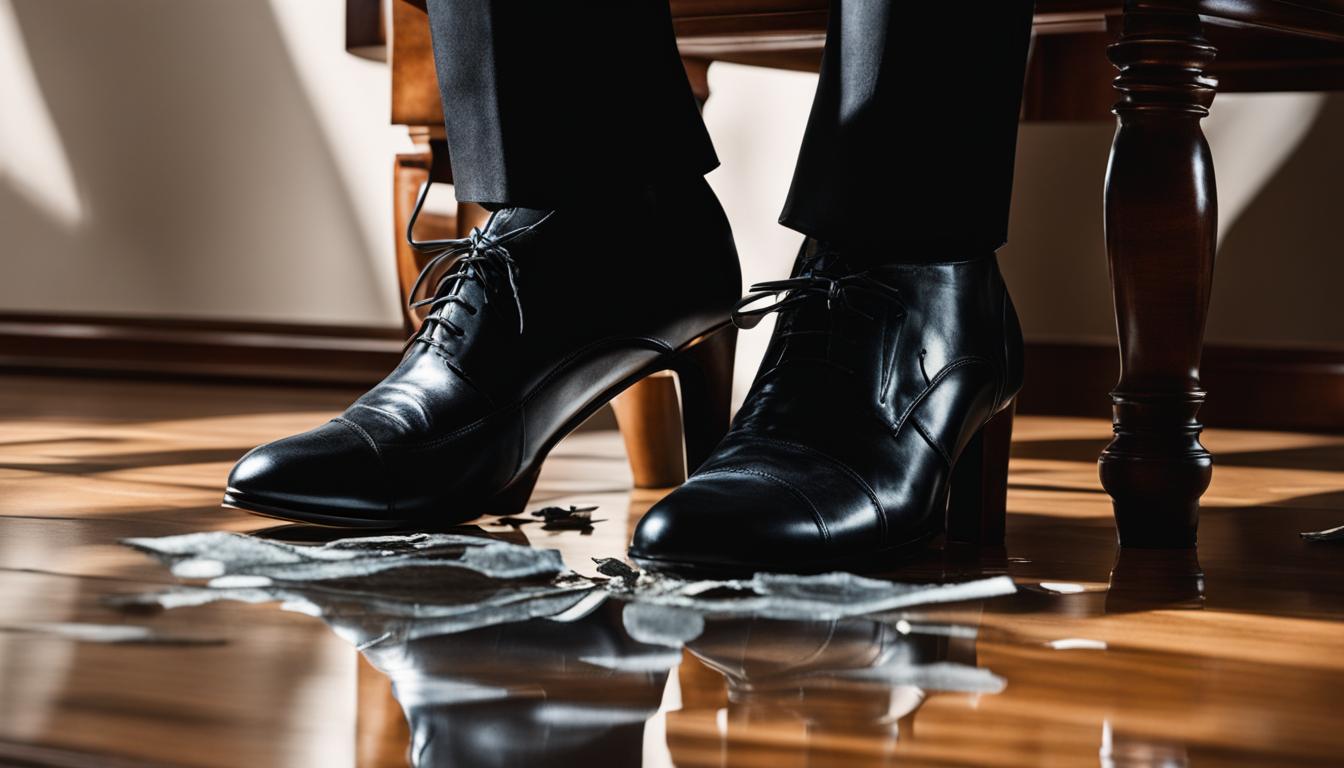Originally posted on November 18, 2023 @ 5:34 am
Have you ever heard the old superstition that putting shoes on a table will bring bad luck? It turns out that this belief is more widespread than you might think, with many cultures around the world holding similar beliefs. Whether it’s because of hygiene concerns, cultural traditions, or superstitions, placing shoes on a table is often seen as a taboo. But where did this idea originate, and what are the consequences of ignoring it?
Key Takeaways
- Shoes on the table are considered bad luck in many cultures around the world.
- There are a variety of reasons why shoes on the table are frowned upon, including hygiene concerns and cultural beliefs.
- Ignoring this taboo can have potential consequences, both in terms of personal relationships and cultural sensitivity.
Understanding Superstitions about Shoes on the Table
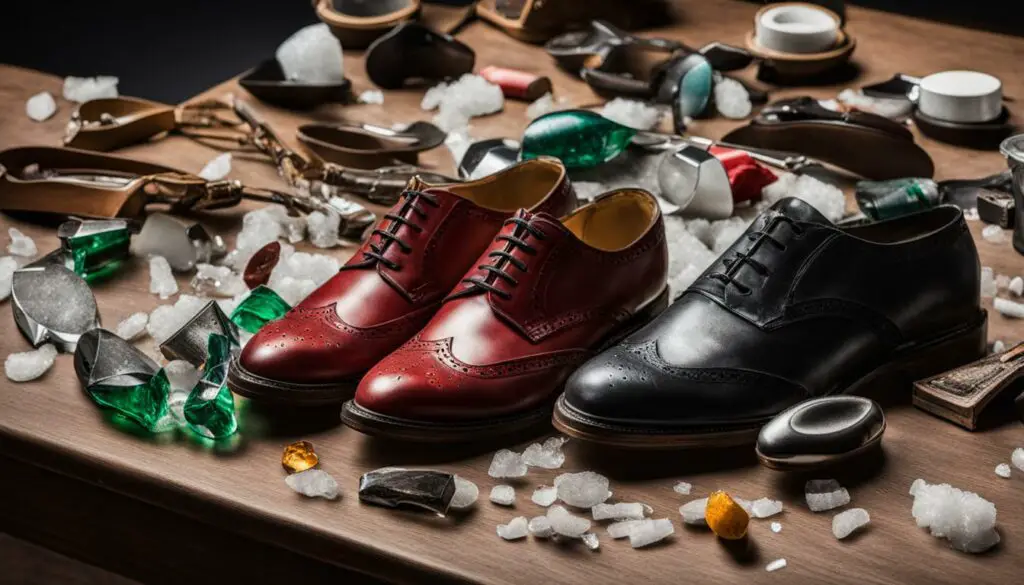
Shoes on the table are not only considered bad luck but are also associated with several superstitions and beliefs. From avoiding misfortune to cultural taboos, there are several reasons why placing shoes on a table is frowned upon. Here, we will delve deeper into some of the most prevalent superstitions and beliefs surrounding shoes on the table.
Superstitions About Shoes on the Table
In many cultures, superstitions dictate that placing shoes on a table can bring bad luck or misfortune. One of the most popular beliefs is that doing so can cause a family member or loved one to die. Other superstitions suggest that shoes on the table can cause arguments and bad luck in business ventures. These superstitions underline the belief that shoes are associated with the ground, considered dirty, and therefore inappropriate for placement on a table.
Beliefs About Shoes on the Table
Moreover, many cultures consider shoes as a symbol of human identity, and they believe they should be kept in an appropriate place. They consider shoes to be an extension of the human body and so putting them on a table is seen as disrespectful. In some cultures, shoes are even believed to be associated with spiritual powers, and therefore placing them on a table is considered an act of defiance against divine powers.
| Country | Belief |
|---|---|
| Japan | Shoes are considered impure and should not be placed on a table as it is regarded as disrespectful to the house. |
| Scotland | It is believed that if you put new shoes on a table, you’ll have bad luck or bring death to a family member. This belief is so strong that many Scottish people won’t even put shoes on a table as a practical joke. |
| Belgium | Belgian people believe that placing shoes on a table is an act of disrespect to the family members who are no longer alive and the ancestors. |
These beliefs and superstitions underline the significant cultural differences surrounding the placement of shoes on a table. While they may seem trivial, they provide valuable insights into the possible reasons behind the belief in bad luck associated with this action.
Cultural Beliefs and Taboos Related to Shoes on the Table
Shoes on the table are not only considered bad luck; they are also a taboo in many cultures. In some countries, it is even seen as a sign of disrespect towards one’s ancestors. Let’s explore a few cultural beliefs about shoes on the table:
Asian cultures
In many Asian countries, such as Japan and Korea, the practice of removing shoes before entering a home is common. As shoes are seen as “dirty” and “outside” objects, it is considered highly inappropriate to place them on a table, which is a sacred space associated with eating and sitting. In Japan, the concept of “kutsu-gaeshi” means flipping your shoes around, so that the dirty soles end up pointing outwards when you put them on a table. This is to show respect and avoid contaminating the clean surface.
| Country | Belief |
|---|---|
| Japan | Placing shoes on the table is disrespectful and shows a lack of hygiene. |
| China | Shoes on the table signify bad luck and can bring misfortune. |
| Korea | Shoes belong on the ground, not on a surface where people eat and sit. |
Western cultures
In Western cultures, shoes on the table are less taboo, but still considered inappropriate. In some European countries, such as France, Italy, and Spain, it is customary to remove shoes when entering a home. While not necessarily a superstition or belief, it is still seen as disrespectful to place shoes on a table, as it is considered unhygienic and rude.
Native American cultures
In many Native American cultures, it is believed that shoes carry the energy of the earth, and that placing them on a table can disrupt the balance of nature. Shoes are seen as symbols of the journey of life, and placing them on a table is seen as disrespectful to both the earth and one’s ancestors.
As we can see, cultural beliefs about shoes on the table are varied and complex. Whether it is seen as a sign of disrespect, a violation of personal space, or a potential source of bad luck, it is clear that this practice should be avoided. By respecting cultural beliefs and taboos, we can ensure that we show kindness and consideration towards others, no matter where we come from.
The Significance of Shoes in Various Cultures
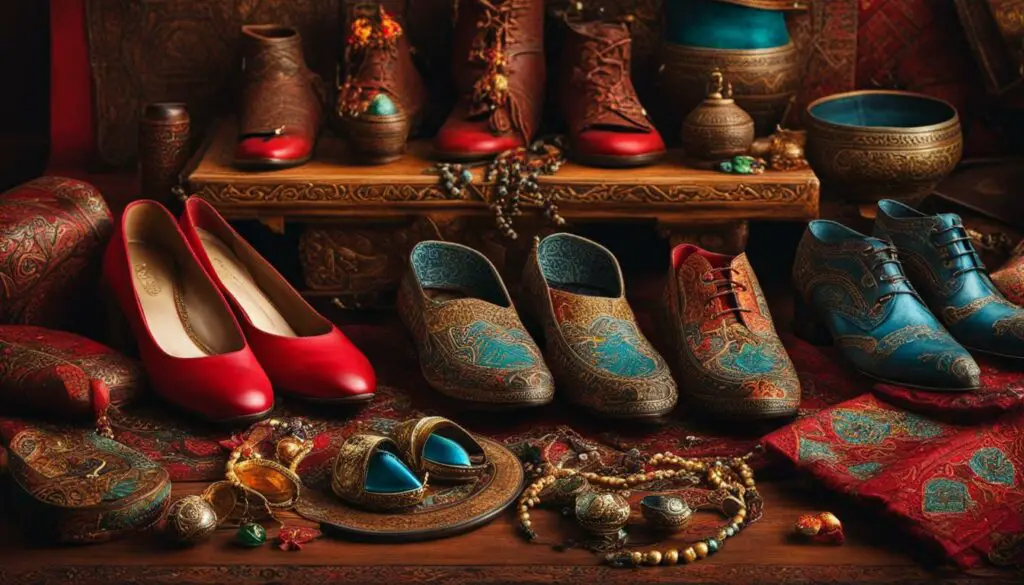
Shoes are more than just a practical accessory; they hold great significance in many cultures around the world. From religious symbolism to cultural customs, shoes can represent a person’s status, personality, or even their spiritual beliefs. Understanding the cultural significance of shoes is essential in comprehending why placing them on a table is considered bad luck.
In some cultures, shoes are seen as a representation of one’s social status or wealth. For example, in ancient Egypt, only the wealthy could afford to wear sandals, while slaves and servants went barefoot. Similarly, in ancient China, shoes with higher platforms were reserved for the upper class, as they were seen as a symbol of power and status.
Shoes can also hold spiritual or religious significance. In Hindu culture, shoes are considered impure as they touch the ground, which is seen as unclean. As a result, it is customary to remove shoes before entering a temple or home. Similarly, in Islamic culture, shoes are seen as unclean and are removed before prayer or entering a mosque.
Shoes also hold significance in various cultural customs. For example, in Arab cultures, it is customary to present shoes as a gift to guests as a sign of hospitality. In some Native American cultures, shoes are removed before entering a sweat lodge, as a sign of respect for the sacred space.
Overall, shoes carry a variety of meanings in different cultures. From status and wealth to spirituality and custom, the symbolism of shoes varies greatly. It is important to understand these cultural perspectives when considering the practice of placing shoes on a table. By respecting the significance of shoes, we can avoid causing offense or inviting bad luck into our lives.
Debunking Myths About Shoes on the Table

There are many myths and misconceptions surrounding the belief that shoes on the table bring bad luck. In this section, we’ll take a closer look at some of these myths and debunk them with facts.
Myth 1: Someone Will Die If You Put Shoes on the Table
“If you put your shoes on the table, a family member will die.”
This is a common myth that has been passed down through generations. However, there is no evidence to suggest that placing shoes on the table will lead to someone’s death.
Myth 2: It’s a Sign of Disrespect to the Dead
“Putting shoes on the table is disrespectful to the dead.”
While some cultures do view shoes as unclean and disrespectful to the dead, this belief is not universal. In fact, many cultures view the symbolism of shoes in a positive light, associating them with protection and the journey of life.
Myth 3: Shoes on the Table Bring Bad Luck
“If you put shoes on the table, you will have bad luck.”
This myth is perhaps the most common belief surrounding shoes on the table. However, there is no evidence to support this claim. While some cultures may view the act as taboo, there is no inherent negative energy associated with the action itself.
As you can see, there are many myths and misconceptions surrounding the belief that shoes on the table bring bad luck. While the practice may be frowned upon in certain cultures, there is no evidence to suggest that it will lead to any negative consequences. It’s important to respect cultural beliefs, but it’s also important to separate fact from fiction.
Understanding the Consequences of Putting Shoes on the Table

Placing shoes on a table may seem like a harmless act, but it can actually have several consequences, ranging from cultural to hygienic concerns.
From a cultural perspective, putting shoes on a table is seen as a sign of disrespect and bad luck in many cultures. It is believed to bring negative energy and cause misfortune. For example, in some Asian cultures, shoes are considered dirty and associated with the ground, and placing them on a table is seen as a violation of cleanliness and hygiene.
From a hygiene standpoint, putting shoes on a table can introduce germs, bacteria, and dirt to the surface, putting those who come in contact with it at risk of infection. This is especially concerning in the case of food-related tables, where contamination can occur, leading to potential health hazards.
In addition to cultural and hygienic concerns, placing shoes on a table can also be a matter of personal space and boundaries. For some individuals, shoes are considered a private and personal item, and placing them on a shared surface like a table is seen as a violation of their personal space.
Overall, there are several consequences associated with putting shoes on a table, ranging from cultural taboos to hygiene and personal space concerns. It is important to be aware of these consequences and to respect cultural beliefs and norms, as well as maintain good hygiene practices to prevent potential health hazards.
Exploring Bad Luck Associated with Shoes on the Table

Shoes on the table have long been associated with bad luck in many cultures around the world. It is believed that placing shoes on a table invites bad luck and potentially opens the door to negative consequences. The origin of this belief is shrouded in mystery, but it remains a common superstition to this day.
There are many anecdotes and stories that reinforce the belief in the negative consequences of placing shoes on a table. For example, some people believe that it can lead to financial loss or cause fights within a family. Others believe that it can bring illness or even death.
While the validity of these beliefs is up for debate, it is clear that the idea of bad luck associated with shoes on the table persists in many cultures. It is a deeply ingrained belief that is often passed down from generation to generation.
Some people believe that the reason behind the bad luck associated with shoes on the table is related to the idea that shoes are associated with the ground and therefore with dirt and germs. Placing them on a table, which is typically associated with cleanliness and hygiene, is thought to be a violation of personal space and boundaries.
Others believe that it is related to the symbolism of shoes in different cultures. In some cultures, shoes are considered a symbol of respect and placing them on a table is therefore seen as disrespectful and rude.
Whatever the reason behind the belief in bad luck associated with shoes on the table, it is clear that this is a deeply ingrained superstition in many cultures. While some may choose to ignore this belief, it is important to respect the cultural and personal perspectives surrounding this practice.
Cultural Perspectives and Reasons to Avoid Putting Shoes on the Table
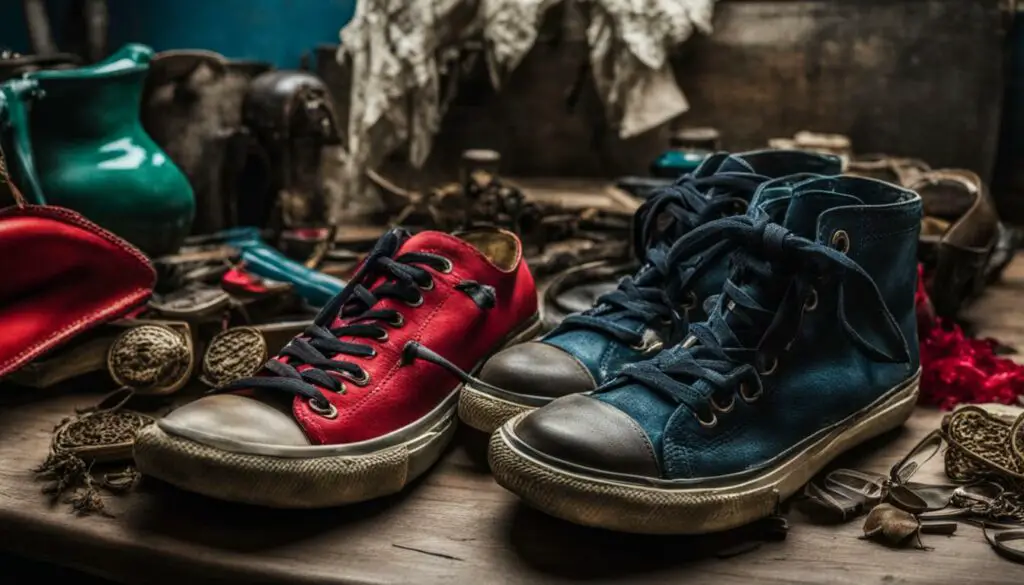
There are several cultural perspectives and reasons why people avoid placing shoes on a table. Firstly, it is believed to be disrespectful to do so, especially in certain cultures where the feet are considered unclean. In these cultures, it is common practice to remove one’s shoes before entering a home or place of worship.
In addition to disrespect, placing shoes on a table can also be seen as a violation of personal space. Tables are typically used for eating and working, and placing shoes on them can introduce dirt and bacteria into these areas. This can be particularly concerning at meal times, where hygiene is of utmost importance.
Another reason to avoid putting shoes on a table is the potential consequences that may arise from doing so. As we discussed earlier, there are many superstitions and beliefs surrounding this practice, with many people associating it with bad luck. Regardless of whether these beliefs hold any merit, it is best to err on the side of caution and avoid engaging in this practice.
Ultimately, whether or not you choose to avoid putting shoes on a table is a personal decision. However, it is important to respect cultural norms and values surrounding this practice, as well as consider the potential consequences of doing so.
Interesting Fact:
In some Middle Eastern cultures, it is considered extremely disrespectful to show someone the bottom of your shoes. This is because the sole of the shoe is seen as the dirtiest part, and showing it to someone is an insult.
The Connection between Shoes and Personal Space
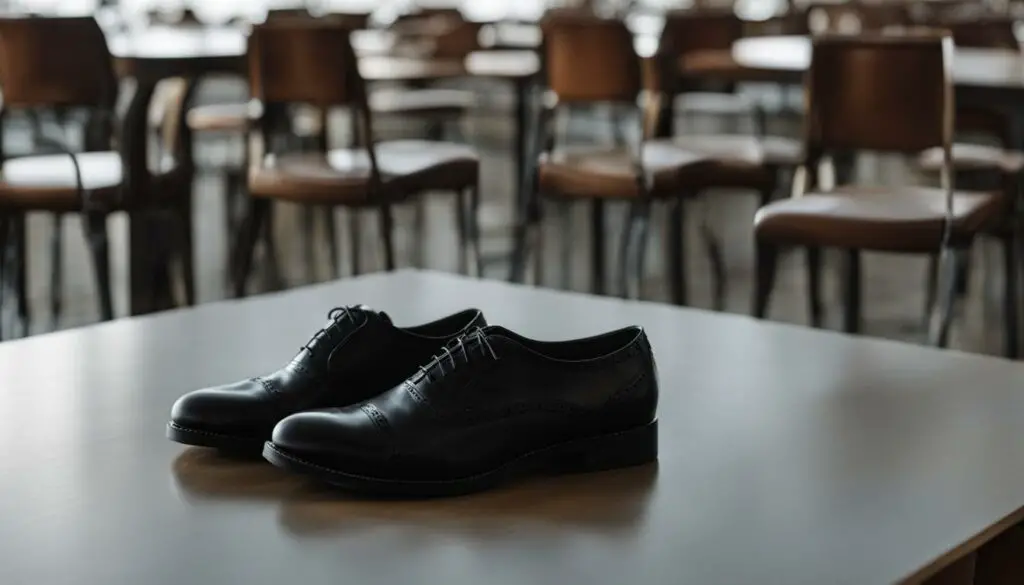
Have you ever wondered why people get offended when you place your shoes on their table? The answer lies in the concept of personal space. Personal space is the area around a person that they consider their own. Placing shoes on a table can be seen as a violation of this personal space, as it involves bringing something that has been in contact with the outside world into a personal, private area.
The connection between shoes and personal space is deeply ingrained in many cultures. For example, in Japanese culture, it is customary to remove shoes before entering a home. This is because shoes are seen as carrying dirt and negative energy from the outside world, and bringing them into a private space can disrupt the balance and harmony of the environment.
Similarly, in many Middle Eastern cultures, it is considered disrespectful to cross your legs and expose the sole of your shoe to someone. The sole of the shoe is seen as unclean, and exposing it to someone is an insult to their personal space and hygiene.
The concept of personal space and hygiene is particularly relevant in today’s world, with the ongoing COVID-19 pandemic. Shoes can carry germs and bacteria from the outside world, which can be harmful if brought into a personal space. Removing shoes before entering a home or private space can help prevent the spread of germs and maintain a hygienic environment.
“The soles of your shoes are dirty and should not be placed on furniture or any place where people sit. Would you want someone to wipe their shoes on your best pants or your dress? Then why would you do it to someone else’s furniture?”
Understanding the connection between shoes and personal space is key to appreciating why placing shoes on a table is considered bad luck. By respecting personal boundaries and hygiene, we can create a more harmonious and respectful environment for ourselves and those around us.
The Impact of Shoes on Table Etiquette
Proper table manners and etiquette are an essential part of many cultures, and placing shoes on a table is often seen as a violation of these norms. In many instances, it is considered impolite and disrespectful to place shoes on a table, as it is seen as a sign of rudeness and disregard for others.
Shoes on table etiquette may differ depending on the culture, but it is generally accepted that shoes belong on one’s feet or on a designated shoe rack. Putting shoes on a table, especially during meals, may be seen as unhygienic and unsanitary, as they collect dirt and germs from various surfaces. Placing them on a table where food is served is not only disrespectful but also poses a potential health risk.
In some cultures, shoes are also associated with the feet, which are considered unclean in some contexts. Placing shoes on a table, especially in a religious setting or during prayer, is considered taboo and disrespectful. It is important to consider the cultural beliefs and norms surrounding shoes on the table, as failure to do so can lead to misunderstandings and offense.
Proper table etiquette also involves being aware of and respecting others’ personal space and boundaries. Placing shoes on a table can be seen as a violation of personal space, as it encroaches upon an area that is typically reserved for food and drink. In many cultures, it is also considered disrespectful to place any type of footwear on a surface that is used for sitting or sleeping.
In conclusion, proper shoes on table etiquette involves being aware of cultural beliefs, respecting personal boundaries, and upholding basic standards of hygiene. Placing shoes on a table can be seen as impolite and disrespectful, and it is important to understand the potential consequences and cultural significance of this practice.
Conclusion
After a thorough exploration of the topic, we can conclude that the belief in bad luck associated with shoes on the table is rooted in cultural beliefs, superstitions, and personal boundaries. While there may be different perspectives and cultural expectations surrounding this practice, it is important to respect the significance attached to it by some individuals and cultures.
Whether it be a matter of hygiene, respect, etiquette, or superstition, placing shoes on a table can have potential consequences and may be seen as a violation of personal space. While some may choose to disregard the belief in bad luck associated with shoes on the table, it is important to acknowledge and understand the significance attached to this practice.
Respect for Cultural Differences
By respecting cultural differences and various perspectives on this topic, we can foster a more inclusive and understanding society. Whether we believe in the superstitions and beliefs surrounding shoes on the table or not, it is important to maintain an open mind and show respect for individuals who hold differing opinions.
Maintaining Personal Boundaries
Personal hygiene and boundaries are important aspects of our daily lives and should be respected. By avoiding actions such as placing shoes on a table, we can maintain personal boundaries and avoid potentially negative consequences.
Thank you for joining us on this exploration of why shoes on the table are considered bad luck. We hope this article has provided valuable insights into the significance of this practice and the reasons behind it.
FAQ
Why are shoes on the table considered bad luck?
Shoes on the table are considered bad luck due to various superstitions and cultural beliefs. Placing shoes on a table is believed to bring negative energy, invite bad luck, or disrespect the personal space of others.
What are the consequences of putting shoes on a table?
The consequences of putting shoes on a table can vary depending on cultural beliefs and individual perspectives. Some potential consequences may include attracting bad luck, causing discomfort or offense to others, violating table etiquette norms, and compromising personal hygiene.
What are some superstitions about shoes on the table?
Superstitions surrounding shoes on the table include beliefs that it can bring financial loss, hinder luck, attract conflict or arguments, and disrupt harmony within the household. These superstitions are often rooted in cultural traditions and folklore.
How do different cultures view shoes on the table?
Different cultures have varying perspectives on placing shoes on a table. While some cultures see it as a serious taboo that brings bad luck, others may not attach any significance to the practice. It is important to respect and understand the cultural beliefs and taboos of the specific community.
Are there any myths about shoes on the table?
Yes, there are several myths surrounding shoes on the table. Some common myths include the belief that it will lead to a fight or argument within the family, cause financial loss, or invite evil spirits into the home. However, it’s important to note that these myths are not based on scientific evidence.
Why should we avoid putting shoes on the table?
There are multiple reasons to avoid putting shoes on a table. It is often seen as a violation of personal hygiene and boundaries, can be disrespectful to others, and goes against accepted table etiquette practices. Additionally, cultural beliefs and superstitions discourage this action to prevent potential negative consequences.
What is the connection between shoes and personal space?
The connection between shoes and personal space lies in the concept of hygiene and boundaries. Placing shoes, which are considered dirty and carry outside pollutants, on a table is seen as a violation of personal space and cleanliness. It is important to respect others’ personal space and maintain a hygienic environment.
How does placing shoes on the table impact table etiquette?
Placing shoes on the table goes against accepted table etiquette norms in many cultures. It is generally considered disrespectful and unhygienic. Proper table etiquette involves keeping shoes on the floor and using the table for food and socializing, maintaining a clean and pleasant dining experience for everyone.
